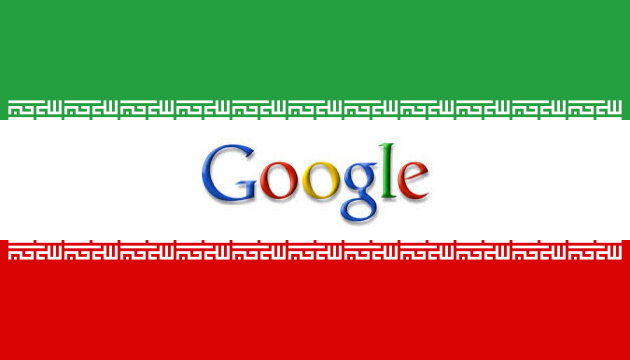
Image remixed by author.
Iran has a habit of blocking, unblocking and sometimes re-blocking Google platforms inside the country.
Google does not maintain physical infrastructure inside Iran, nor is there a google.ir domain. But Iran's Ministry of ICT announced today that they are willing to open a new chapter in the country's tumultuous relationship with the Internet giant and allow Google to operate inside Iran, as long as the company respects its “cultural conditions”. This announcement did not clarify what the conditions were, nor what the scope of Google's operations inside Iran might be.
This Sunday Deputy Minister of Information and Communication Technology Nasrallah Jahangard told Fars News Agency (an “independent news agency” according to their own website, but one that is viewed as a “semi-official” news agency of the state):
We don't oppose all those people who are in the international market and want to provide services in Iran, and we are ready to hold negotiations with them for their service providing in the Iranian market after accepting Iran's cultural conditions…Also, we are ready to provide Google or any other company with Iran's possibilities and facilities for service providing to the region.
In addition to lacking an Iranian domain, Google has had its affiliated platforms subjected to censorship over the years.
YouTube, Google's wholly owned video-sharing website was first blocked in 2006 for immoral content after a popular video featuring an Iranian soap opera star surfaced there. The block was later lifted but reinstated after the 2009 presidential elections.
The controversy over the Innocence of Muslims trailer in 2012 also led the government to temporarily block Gmail. Currently Gmail is accessible in Iran, while YouTube remains blocked.
The deputy minister acknowledged the strictures placed on the government when negotiating with foreign companies due to the US-backed international sanctions on the country, but said they were in negotiations with non-US companies over “imminent operations in Iran.” In May of 2013, the US removed communications sanctions on Iran, allowing for the sale of American communications equipment, fee-based software and instant messaging services. It was only in August 2013 that Google allowed its Google Play store to operate inside Iran.
Google is no stranger to tenuous operating conditions. Originally the company complied with China's tight censorship regulations, much to the chagrin of digital rights advocates, but it changed tack after large scale China-originated hacks on the company and its Gmail accounts upset the relationship between the pair in 2010.
Immediately following the hacks, Google redirected its Chinese operations to Hong Kong from the domain google.cn to google.com.hk, which is not subject to Chinese censorship and surveillance.
Announcements from Iran's Telecommunications Infrastructure Company (TCI) also indicated that Iran wanted to initiate formal relations with the company as early as October 2013. The managing director of TCI announced that they were ready to start hosting data centers where Google and Yahoo would store information from their Iranian-based clients, much like they do in countries such as Turkey.
Nothing new in Jahangard's comments about Google in Iran, TCI requested local caches over a year ago. http://t.co/0CcQLxloU1
— Collin Anderson (@CDA) March 1, 2015



